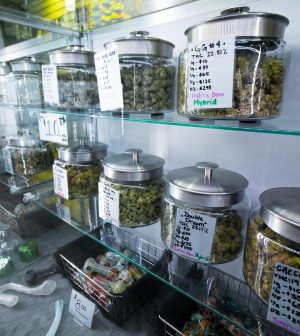- The Best Time of Day to Drink Bone Broth to Maximize Health Benefits
- 8 Ways to Increase Dopamine Naturally
- 7 Best Breads for Maintaining Stable Blood Sugar
- Gelatin vs. Collagen: Which is Best for Skin, Nails, and Joints?
- The Long-Term Effects of Daily Turmeric Supplements on Liver Health
- Could Your Grocery Store Meat Be Causing Recurring UTIs?
- Are You Making This Expensive Thermostat Error This Winter?
- Recognizing the Signs of Hypothyroidism
- 10 Strategies to Overcome Insomnia
- Could Artificial Sweeteners Be Aging the Brain Faster?
Drinking Rates Crept Up in U.S. States Once Weed Was Made Legal

Could unfettered access to marijuana fuel a rise in drinking rates?
Yes, report researchers who found alcohol consumption increased at times and in places where marijuana was made legal for certain groups.
The increase in drinking was mostly driven by young adults and men, according to University of Pittsburgh School of Public Health policy scientists.
“Recreational cannabis laws have made cannabis legally accessible to nearly half of U.S. adults, but it has been unclear how this affects the use of other substances, such as alcohol,” said senior study author Coleman Drake, an assistant professor in the department of health policy and management at Pitt Public Health.
“It appears that cannabis use increases the probability that people drink, at least in the three years after legalization,” Drake said in a university news release.
The researchers used data on 4.2 million adults from federal government surveys administered from 2010 through 2019. During this time period, 11 states legalized recreational cannabis.
Survey questions included those on any alcohol use, binge drinking and heavy drinking. The research team compared answers from before cannabis was legal to after it was legalized.
The overall data showed that having at least one drink of any alcoholic beverage in the past month increased by 1.2 percentage points in the first year after recreational cannabis was legalized. However, that number dropped in the following two years. No change was found for binge or heavy drinking in the overall population.
Researchers then looked at drinking data for adults ages 18 to 24. There, they found an increase of 3.7 percentage points in any drinking for this age group. However, only an association was seen between drinking rates and marijuana legalization, rather than a cause-and-effect link.
No other age group had a statistically significant increase in drinking. Men, non-Hispanic white people and those without some college education did see an increase.
Cannabis use has nearly doubled in the past 10 years, Drake said. Between 2011 and 2015, excessive alcohol use led to the deaths of more than 93,000 Americans, he noted.
“So, it will be important to monitor whether recreational cannabis laws cause increases in drinking over longer periods of time, particularly among younger adults and men,” Drake said.
States can work to prevent risk through public health campaigns or alcohol taxing strategies by zeroing in on those who are most vulnerable, he said.
“In prior work, I found that recreational cannabis laws temporarily reduced opioid-related emergency department visits,” Drake said. “So, I would resist characterizations of cannabis legalization as categorically good or bad.
“We need to learn more about how cannabis legalization affects all substance use, health and non-health outcomes, such as drug-related arrest rates, work-related injuries and labor market outcomes,” he noted. “Policymakers should try to think through all these costs and benefits as they consider passing recreational cannabis laws.”
The study was supported by the U.S. National Institute on Drug Abuse and published recently in JAMA Health Forum.
More information
The U.S. Centers for Disease Control and Prevention has more on marijuana and public health.
SOURCE: University of Pittsburgh, news release, Nov. 28, 2022
Source: HealthDay
Copyright © 2026 HealthDay. All rights reserved.










